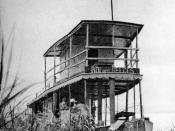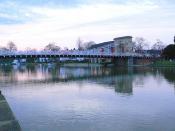Known as Conrad's most enigmatic and haunting work, this 1902 psychological thriller continues to pluck strings deeply planted in the human heart. Story of a young Englishman Marlow's adventure up the Congo River, Conrad paints a surreal yet harshly concrete tale evolving around the disturbances of the spirit. Marlow narrates his encounter (mental and physical) with the unfathomable Kurtz, a half-English, half-French ivory trader in the heart of Dark Africa yet to be explored. Long before Kurtz even takes shape and dictates his own path, his life is sewn into the lush landscape and told by despairing pioneers who worship the very characteristics that drive Kurtz to madness-the ambition to crown Western colonialism with the last uncharted puzzle of humanity. His impenetrable nature, more so than Congo it seems, dazzles and puzzles the natives as well as the whites who attempt to gain a better sense of identity through supremacism.
Kurtz's ability to exert control over men and rule spiritually without physical manipulation is revealed as Marlow's own troubled spirit fuses into Kurtz's whirlpool of obsession to conquer and glorify brutality of another sort. Thus as Marlow ventures upstream towards Kurtz's quarter, appalled and fascinated by Kurtz's ominous sense of balance in a world of cannibals. Again, men who come hoping to conquer and penetrate, find not virgin soul ready to be sown with Western seeds, but the ultimate unconquerable and impenetrable in their own frail heart too shielded from the naked truth of life. Here, in Congo, Kurtz loses sanity as he is forced to stoop when he is conquered and penetrated by the harshness of Africa and its beaming beastliness that also roars underneath his pale skin. Marlow, as the sole heir to Kurtz's memory as a "hero", returns with a...


